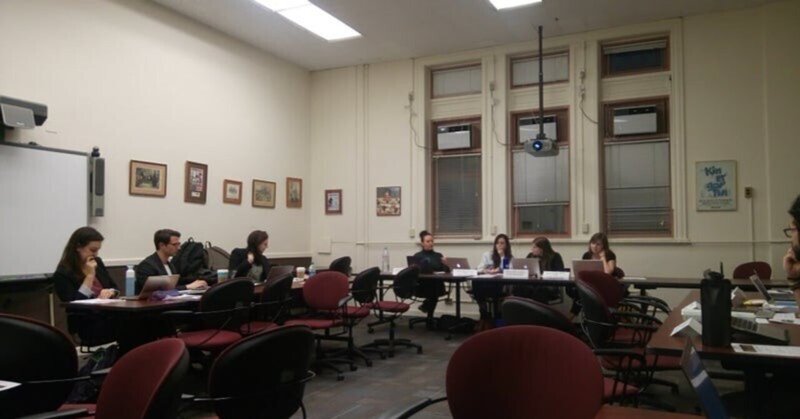
Spring 2018 Course2: Education Policy Analysis/Implementation -教育政策の分析と実行-
Introduction of my second spring course: Education Policy Analysis/Implementation at Teachers College!
さて今回は春学期の授業紹介2つ目、教育政策に関するTCのコース!
(教育関係のマガジンはこちら)
1. 教授はどんな人? ~リサーチは普及しなければ意味がない~
教授はProf. Luis Huerta。
実は彼は昨年度sabbaticalだったため私の最終学期になるこの春に戻ってきてくれたのはとてもラッキーでした。
彼はリサーチはただ書くだけではなくdissemination(普及)しなければ意味がない、という信念を持っていて、
学期中もPuerto RicoのSchool choice法案審議の参考人として飛び回ったりしているようです。
Prof. Luis Huerta offers this course. He was taking sabbatical for more than a year, so I was very fortunate to take this course in my last semester at Columba.
He emphasizes the importance of dissemination of research, which I totally agree with, and frequently traveled to Puerto Rico for the testimony regarding a school choice bill.
2. コース内容は? ~シラバスより~
では次のコースの内容ということでシラバスの抜粋を。Below is the excerpt of syllabus to give you an overview of the course.
●Section 1: Introduction and Overview of Four Frameworks. Understanding political contention and local school responses.
・Week 1: Introductions, course overview, introduction of four frameworks. Getting warmed up to the current school reform debate from the perspective of policy implementation.
・Week 2: Historical and contemporary conceptions of the ills facing the public school system.
●Section 2: The Political Frame. Theories of state action. Understanding how policy actions flows from political ideology to schools.
・Week 3-4: The political frame for analyzing what forces motivate policy makers, and their intended effects.
・Week 5-6: The State pushing for centralized accoutability reforms. State policy makers pursuit of organizational change inside schools.
・Week 7: Policy Simulation 1 - Teacher Evaluation and Merit Pay
●Section 3: The Institutions and Organizational Frame. Implementing policy in the corner of theories of organizational inertia and change: School inputs and/or institutional dynamics.
・Week 8: What is the school's political and institutional role in reinforcing (or transforming) our society's basic economic and social norms?
・Week 9: Implementation and the institutional mediation of new inputs and reforms
・Week 10: Sociological perspectives on barriers to implementing effecti change at the organization and institutional level
・Week 11: What can the State do to make a difference within schools?
・Week 12: Policy Simulation 2 - Class Size Reduction
●Section 4: The Economics and Effiiciency Frame
・Week 13: Does money make a difference?
・Week 14: Market models of educational improvement... vouchers and tax credits
・Week 15: Charter schools and the paradox of democratic localism
・Policy Simulation 3 - Vouchers and Tax Credits
3. 授業の特徴は? ~インテンシブ+Policy Simulation~
タイトルからも分かるとおり、このクラスは教育政策のImplementation(実行段階)に着目して、
ある政策が作られ、学校現場に辿り着くまでの間にどう変わり、そして何故変化がこうも起こりづらいのか?ということを、
政治学的、組織的、あるいは経済学的な観点から分析していくものです。
As you can see from the title, this course focuses on the implementation of education policy; in other words, how are policies changed in the process of formulation and practice, and why is it so difficult to change schools? We analyze it from political, institutional and organizational, and economic perspectives.
そしてこのコース、初回に教授からも釘を刺されたのですが、Introductory Courseではないため、相当インテンシブです…!
(私がこれまで取った3単位のクラスの中では最もworkloadがきついです)
毎回のクラスのdiscussion、そして2回のIndividual Policy Memo。さらに、Policy Simulationという、とある仮定の政策課題に対して関係者が2時間まるまる使ってディベートを行うというものがあります(こちらもグループでPolicy Memoを提出した上で議論に臨みます)。
下の写真は前回のSimulationの様子。
And importantly, this course is not introductory, which the prof sort of warned in the first class, and VERY intensive. I would say it's the most demanding among the all 3-credit courses that I have taken at Columbia. In addition to class discussion and two individual policy memos, we have three Policy Simulations, where we spend a whole class on debate based on a specific policy issue and in a specific policy context (we also have to submit group memos). The pic below is taken during the first simulation.

例えば来週は、Class size reductionを行ったカリフォルニアの架空の学区が財政状況が厳しくなってきてこれを維持できないという設定で、
どこまで廃止するのか?他にどのような政策を打つのか?をそれぞれの立場から議論します。
(ちなみに私のグループは学区教育委員会の立場なので、自分達の意見の他に利害関係者のプレゼンも踏まえて提案を修正等その場でしなければいけず、めちゃくちゃ臨機応変さが問われます^^;)
For example, next week we will have a simulation on class size reduction (CSR). A fictional school district in CA, which has adopted CSR, is now faced with a severe fiscal condition, and cannot completely maintain CSR. So to what extent should we roll it back? What are other policy options?
We will present our recommendation from distinct perspectives: school board, community based organization etc. BTW, our group will play the role of school district, which has to reconcile different opinions in addition to presenting our own, so much improvisation is needed!!
4. コースからの学びは? ~Conceptual FrameworkとActivation of Knowledge~
このクラスで私が学んだ最も重要なことの1つが、Conceptual Frameworkの重要性です。
Policy Memoでは3つのRecommendationsを考えるのですが、それがばらばらではなく、自らの採用するoverarchingな概念・理論と整合性が取れていることを要求されます。
またRecommendationにもエビデンスを沢山いれてそれを裏付けするのですが、ただ文献を引用するだけではなく、なぜそれがこのケースの根拠となるのか?どの程度適用性があるのか?を自らの言葉でしっかりと説明することを強調されます。
これを"Activation of Knowledge"と教授は呼んでいて、これをするためにはしっかりと文献を表面上ではなく読み込まなければなりません。
One of the best lessons that I learned here is the importance of conceptual framework. We are expected to align our three recommendations in policy memos with overarching conceptual frameworks that we adopt, rather than putting them arbitrarily. Additionally, when we incorporate evidence to back up our argument, we also have to explain "why is this research relevant to our case?" "What is the applicability?" rather than just citing it. The prof calls it "Activation of Knowledge," which entails more than skimming of articles.
Policy Memo自体は3~4頁ですが、ひたすら文献を入れて半分以上のsentenceについてエビデンスを提供する必要があるので、Endnoteが中々多量になります。
以下がこれまで私が書いたIndividual Memoです。
1つ目は教授から今後の模範例に使いたいと言ってもらえました^^
Although the memo is 3-4 pages, because we put so much evidence in more than half of the sentences, the endnotes incluce many references. Below are the two memos I submitted (the prof said he would like to use my first memo as a future exemplar!)
とてもintensiveなこのコースですが、教授の熱意(毎回のクラスで文献を要約したhandoutを配布してくれたり、Simulationに先立って個別のアポを設定してくれたりします)や優秀なクラスメートに刺激されて楽しんでいます!
Although very intensive, I enjoy this course a lot, inspired by the professor (he kindly distributes handouts detailing main points of readings and have appointments with us to get ready for simulations) and amazing classmates!!
長くなってきたので、今回はこのあたりで。次回はまた別のコースについて紹介しますね!
I know it's getting lengthy, so let me stop here. Next time I'll introduce another course!!
(※本ポストは、2018年4月時点のものをリメイクしたものです。)
この記事が気に入ったらサポートをしてみませんか?
